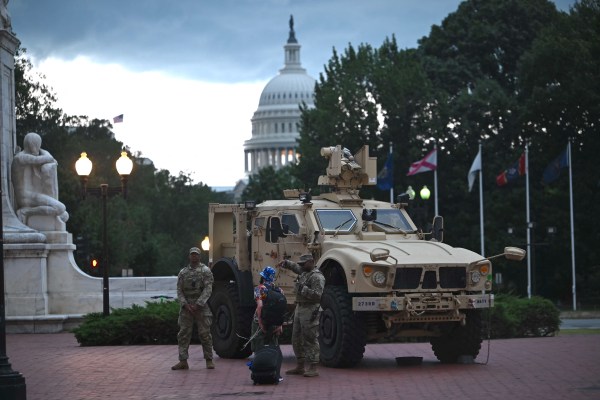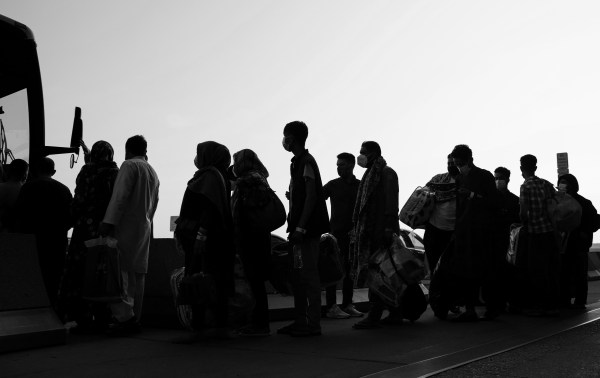The first time a young Christian from Afghanistan heard music at a church service where he understood at least some of the language, it was Christmas at Apostles Church in Raleigh, North Carolina. “It was amazing. I was telling myself, ‘Wow, it was beautiful,’” he recalled in an interview with The Dispatch earlier this week.
The man, whom we’ll call Ahmad to protect his family remaining in Afghanistan, recounted how before that Christmas service in 2023, he was only able to quietly worship in Afghanistan with a small number of other believers. Ahmad’s conversion to Christianity after attending a university in Afghanistan led to his imprisonment by the Taliban—where he said he was beaten and tortured via electric shock—before fellow Christians were able to ransom him from Taliban captivity. The same Christians who got Ahmad out of prison then got him out of Afghanistan by helping him travel to Brazil. Ahmad traversed on foot the Darién Gap that connects Central and South America for three days and ultimately—after presenting himself at the southern U.S. border seeking asylum—made a home for himself in Raleigh.
“I cannot think of going back to Afghanistan. ... The Taliban soldiers, the leaders, they somehow think they are serving God … if they can kill Americans, if they can kill Christians. … I will not survive.”
Ahmad
In North Carolina, Ahmad found a job at a restaurant (as parole granted to him legally allowed him to do), improved his English, and has become an integral member of his congregation. But his days of worshipping freely and without fear at Apostles Church may have come to an end after Holy Thursday services last night, when Christians around the world commemorated the Last Supper before Jesus was betrayed and then crucified the next day.
Ahmad, like some other Afghans legally living in the United States, received a letter from the Department of Homeland Security (DHS) telling him he must leave the country by Good Friday. “Your parole will terminate 7 days from the date of this notice,” reads the April 11 DHS letter to Ahmad. “If you do not depart from the United States immediately you will be subject to potential law enforcement actions that will result in your removal from the United States — unless you have otherwise obtained a lawful basis to remain here. … You will be subject to potential criminal prosecution, civil fines, and penalties, and any other lawful options available to the federal government.”
The letter was “shocking news” to him and roughly two dozen fellow Afghan Christians who attend Apostles Church and are now also at risk of deportation, he said.
It’s not clear precisely how many Afghans legally in the United States received the letter telling them that they must self-deport. “The Afghans receiving the ‘leave immediately’/7-day notifications in the past week seem to be those who entered with [humanitarian] parole at the port of entry from Mexico,” Matthew Soerens, vice president of advocacy and policy at the evangelical charity World Relief, told The Dispatch. Soerens said he was “anecdotally aware of a number of cases of Christians who were not prioritized for evacuation in 2021 who made their way, often through networks of missionary connections, to the Western Hemisphere and then made their way up to the U.S.-Mexico border, where after waiting for a [Customs and Border Protection] One app appointment they were generally paroled into the U.S.”
Contacted by The Dispatch, the Department of Homeland Security did not provide precise figures on how many Afghan parolees were told to leave the country but confirmed that at least 9,000 Afghans in the United States will lose their legal status, known as Temporary Protected Status (TPS). The executive branch may grant that classification to categories of migrants from countries that are “subject to armed conflict, natural disaster, or other extraordinary temporary conditions.” On March 21, DHS Secretary Kristi Noem “determined that Afghanistan no longer continues to meet the statutory requirements for its TPS designation and so she terminated TPS for Afghanistan,” DHS spokeswoman Tricia McLaughlin told The Dispatch in an email. Those Afghans who worked for the U.S. government and were granted Special Immigrant Visas have not had their legal status revoked.
“World Relief—joined by partners like the Ethics & Religious Liberty Commission of the Southern Baptist Convention and the National Association of Evangelicals—has urged the administration to reconsider these revocations of temporary legal protections,” Soerens told The Dispatch. “We’ve also urged Congress to pass legislation such as the Afghan Adjustment Act, a bill that would allow most Afghans to apply for permanent legal status after undergoing additional vetting, and which has enjoyed very broad bipartisan support but never received a vote.”
The Trump administration’s revocation of TPS for more than 500,000 migrants from Venezuela, Cuba, Nicaragua, and Haiti has been enjoined by a lower court ruling, and a similar legal fight over revoking TPS for Afghans will likely occur after the Department of Homeland Security formally publishes a notice revoking their status.
Ahmad has no plans of self-deporting to face the Taliban and still hopes his asylum claim will be granted. “I cannot think of going back to Afghanistan,” he told The Dispatch. “The Taliban soldiers, the leaders, they somehow think they are serving God … if they can kill Americans, if they can kill Christians. … I will not survive.”
Hayes Thielman, a pastor at Apostles Church, told The Dispatch that the congregation, which is predominantly white and leans politically conservative, is rallying behind the Afghan members of the congregation now living in fear of being deported to a country where they would be persecuted or killed. “We’re raising money to get immigration lawyers,” said Thielman. He noted the bitter “irony that on the day Jesus was crucified, Christians who were fleeing persecution are being sent out of our country.”
Andre Mann, a member of Apostles Church in Raleigh and an American who worked with military contractors in Afghanistan from 2006 to 2011, was involved in an “underground railroad” that helped more than 1,400 Afghans flee the Taliban following the fall of Kabul by getting them to any country that would take them. Mann believes, based on his personal interactions, that there are many Christians who are among the Afghans being told to leave the country. “Their lives were in danger. They were getting hunted. They didn’t want to leave Afghanistan, but they had to flee,” Mann told The Dispatch. “It’s unknown what’s actually going to happen, whether this letter is just kind of to scare them and see if they’ll leave” or “whether, come Friday, someone’s going to show up at their doorstep because [federal agents] have their addresses because they’ve legally been here.”
Mann said he hoped the Trump administration would reverse course after realizing just how vulnerable of a population Afghan asylum seekers are: “As an American, I would hope that the U.S. would be the last place that someone who’s fled religious persecution is afraid for their life.”










Please note that we at The Dispatch hold ourselves, our work, and our commenters to a higher standard than other places on the internet. We welcome comments that foster genuine debate or discussion—including comments critical of us or our work—but responses that include ad hominem attacks on fellow Dispatch members or are intended to stoke fear and anger may be moderated.
With your membership, you only have the ability to comment on The Morning Dispatch articles. Consider upgrading to join the conversation everywhere.